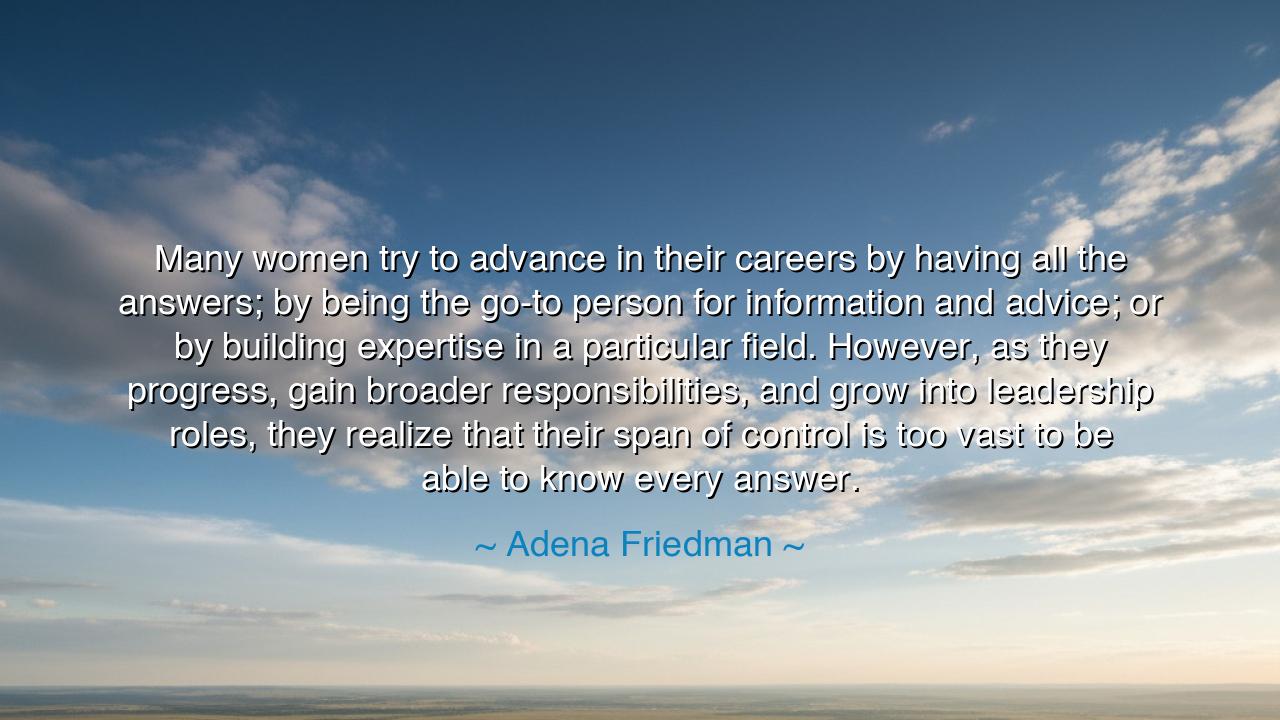
Many women try to advance in their careers by having all the
Many women try to advance in their careers by having all the answers; by being the go-to person for information and advice; or by building expertise in a particular field. However, as they progress, gain broader responsibilities, and grow into leadership roles, they realize that their span of control is too vast to be able to know every answer.






In the words of Adena Friedman: “Many women try to advance in their careers by having all the answers; by being the go-to person for information and advice; or by building expertise in a particular field. However, as they progress, gain broader responsibilities, and grow into leadership roles, they realize that their span of control is too vast to be able to know every answer.” These words flow with a deep and ancient wisdom, for they reveal that true leadership is not the hoarding of knowledge, but the art of guiding others in their knowledge. To know everything is impossible; to lead wisely is eternal.
The ancients saw this truth in their own ways. Consider the story of Moses, burdened by the cries of the people of Israel. At first, he tried to answer every question, to judge every dispute, to carry the weight of all decisions upon his shoulders. But his father-in-law Jethro counseled him: “You cannot bear this alone.” And so Moses appointed judges and counselors beneath him, sharing authority, building a structure where the strength of many replaced the exhaustion of one. This is the very essence of Friedman’s words: the recognition that leadership is not solitary brilliance, but the gathering and guiding of the wisdom of others.
In the history of Rome, too, we find this lesson. Julius Caesar was famed for his genius, yet it was not his answers alone that secured his victories. He relied on generals, on scouts, on engineers, on men who carried knowledge beyond his own. His greatness lay not in knowing all things, but in orchestrating the many into one harmonious force. The leader does not stand as an encyclopedia; the leader stands as a conductor of voices, ensuring that each note strengthens the whole.
Friedman’s words also speak to the path of many women, who, facing skepticism in the early stages of their journeys, feel compelled to prove themselves by knowing more, working harder, holding answers when no one expects them from others. And yet, as they ascend, they discover that this very instinct becomes a burden. For in the wide realms of leadership, no single mind can hold all knowledge. Instead, greatness comes from trust, delegation, and the humility to say, “I do not know this, but I know who does.” This humility is not weakness, but the mark of true strength.
We must remember, too, that societies rise or fall not because one person knew everything, but because leaders nurtured the talents of many. The Renaissance flourished because patrons, thinkers, and artisans each carried their part. The great voyages of discovery succeeded not by the captain’s sole knowledge, but by the navigators, shipbuilders, and sailors who worked in unity. To demand of oneself “all the answers” is to mistake the role of leader for the role of servant; the leader’s task is not to bear every weight, but to guide others in bearing theirs.
The lesson here is clear: whether woman or man, the path of leadership demands a shift—from mastery of answers to mastery of vision. In the early days, work diligently, build your expertise, become the one who can be relied upon. But as your path widens, learn to release the illusion of omniscience. Build trust. Raise others to shine. Lead not by knowing everything, but by inspiring others to bring their knowledge into the light.
Therefore, O seeker, take these words as a guide: labor well in your beginnings, but do not chain yourself to the burden of all answers. When your calling expands, let go of pride and embrace humility. Say to those around you, “I trust you; your knowledge strengthens us.” For in this lies the secret of enduring leadership—to be not the fountain of all waters, but the channel that unites many streams into a single mighty river.






AAdministratorAdministrator
Welcome, honored guests. Please leave a comment, we will respond soon